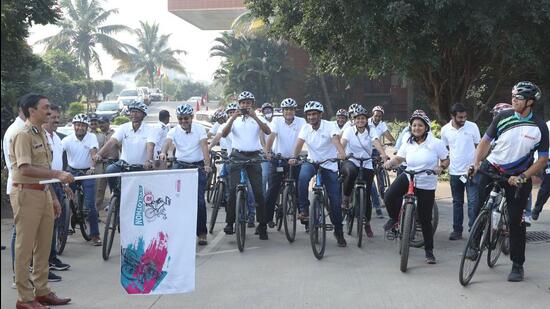Bosch in Pune aims to cut traffic snarls, encourages ‘cycle to work’ initiative
Pune police commissioner Amitabh Gupta flagged off Bosch Global Software Technologies Pvt Ltd’s first ‘bicycle to work’ initiative on Monday
There was a time in the distant past when Pune wore the moniker of ‘Pensioner’s paradise’ with pride; the weather was moderate, the city’s unclogged thoroughfares facilitated smooth travel and cyclists joyously ambled across neighbourhoods.

Much has changed since then as the city expanded to contain the influx of people, primarily in its growing IT sector. In its quest to emerge as a prominent metro, Pune has now assumed the tiresome burden that major Indian metropolises bear – traffic snarls and pollution.
There are 753,222 four-wheelers and 3,223,135 two-wheelers running on city roads today. Pune RTO registered 553,951 cars between 2012 and September, 2022. Apart from this, 88,674 auto rickshaws, 36,946 taxis and 3,375 school buses ply on city roads, measuring 1398.61 kms, daily.
In August this year, on his way to Satara, when chief minister Eknath Shinde’s convoy was caught in a traffic snarl at Chandni Chowk, police from Pimpri-Chinchwad were compelled to intervene and clear the clog. The CM stepped out of his vehicle and interacted with citizens; a day later, officials were instructed to speed up the demolition of the old bridge at Chandni Chowk to ease traffic flow.
In October, caught in a traffic jam, the India CEO of Mercedes-Benz, Martin Schwenk, made the smart move to step out of his car and take an autorickshaw to thread through the heavy traffic (he had shared the story on social media).
The ongoing work for Metro on the Baner-Balewadi stretch, an upscale neighbourhood that houses many top-end restaurants and pubs, has prompted multinational companies to look for alternative modes of transport, with Bosch Global Software Technologies Pvt Ltd launching its first ‘bicycle to work’ initiative on Monday. More than 20 employees arrived to work on their bicycles early morning, along with their department heads.
The initiative was flagged off by the Pune police commissioner Amitabh Gupta, an avid cyclist himself, who is also keen to promote cycling in the city.
“A similar initiative in our Bengaluru office received a positive response, motivating our employees (1,000 in Pune) to use bicycles for a home to office commute, to control pollution, evade traffic jams and maintain a healthy lifestyle with our programme Fit for Future,” said Amit Kumar Srivastava, Engineering Center Head, Bosch Global Software Technologies Pvt Ltd, Pune.
“One hundred and three employees have pledged to cycle to work at least once a week.” A project called ‘Friday fly’ has been initiated to motivate employees who wish to cycle but are hesitant – a bicycle cloud system has been created which will include a repair setup in the parking space, along with trainer wheels.
Applauding the initiative, Amitabh Gupta expressed keenness to work with other corporates to promote the concept. “Cycling is the most effective form of exercise that boosts your energy levels. I cycle around the city twice a week. Such an initiative will change the mindset of people and also help the environment. We want the public to work with the police and bring back the cycling culture,” said Gupta. “We will conduct such events in the near future in other IT parks to encourage employees to use bicycles.”
The rush on the roads prompted Vidya Yeravdekar, pro-chancellor, Symbiosis International University, to move from her family home in Navipeth to the Symbiosis University and Research Centre’s campus in Lavale.
The administration has also changed the working hours from 9:30 am to 5:30 pm to 8:30 am to 4:30 pm, “so that people can beat the morning traffic”. “Back in the day, it used to take me 45 minutes to commute from Navipeth to Lavale; today it takes two hours,” said Yeravdekar, adding that students of Symbiosis Institute of Business Management have been tasked with a case study to find solutions to the traffic problem.
Before the pandemic paralysed movement in the city, many corporates in Pune had started encouraging their employees to switch to this eco-friendly mode of transport. An attempt was made in 2019 by a group of IT professionals and cycling enthusiasts, who started the cycle to work forum and a website cycletowork.in which has since gained momentum.
Abhijeet Kupate, an IT professional, rides his bicycle daily from Ravet to Baner (approximately 12 kilometers). It has changed the mindset of his company, GS Labs, with many of his colleagues riding to work now. “We are slowly seeing a change in companies who are creating spaces for their employees who ride bicycles to work. Our forum has members such as Devendra Yadav, of Cognizant, who has begun a green club in his company to promote cycling,” said Kupate.
Many employees of Pinnacle Industries had started cycling to work in 2019; the company is trying to revive the initiative post-pandemic. Sudhir Mehta, chairman of the company, felt Pune needs an eco-system to nurture cyclists.
“There are safety issues on city roads. Congested roads are not conducive for cyclists. Forty per cent of the roads have been taken up for Metro work,” said Mehta.
“Cycling to work is feasible within a space such as the Magarpatta IT Park, for employees to travel within the corporate campus.”
An IT professional and a cyclist, Kiran Mujumale rides from his home to office (10 kilometers) every Friday, while bicycle trips off the city are planned with friends for the weekends.
“There is much awareness among those who wish to remain fit. As IT professionals, we sit for hours at our computers; this is a healthy alternative,” said Mujumale.
Rahul Shrirame, deputy commissioner of police (traffic) said, “The present traffic situation in the city has created many problems for commuters, and our department is continuously trying to find solutions to smoothen traffic issues. Such initiatives by companies will certainly help reduce pollution and congestion on roads.”





